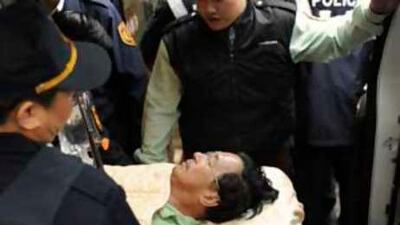BEIJING // The former president of Taiwan has vowed to carry on a hunger strike to protest against his arrest on what he calls politically motivated charges of corruption, despite being taken to hospital. Chen Shui-bian, who served as president for eight years until 2008, is the latest of about a dozen high-ranking members of his opposition Democratic Progressive Party (DPP) to be detained on charges related to corruption since the Kuomintang (KMT), or Nationalist Party, regained the presidency in May. His arrest has sparked an outcry from critics of the current government and yesterday supporters of Mr Chen announced plans for a mass demonstration at a Taipei park on Saturday. Analysts said his arrest has highlighted problems with Taiwanese law and the country's judicial system. Mr Chen, who told doctors yesterday he would continue to refuse food, is charged with money laundering and illegally using a special presidential fund. He denies all the charges. He was taken to hospital on Sunday night, five days after he began a hunger strike, and accepted glucose and saline injections to stabilise his deteriorating condition. Critics of the new government, led by Ma Ying-jeou, have criticised the laws being used to detain the suspects. In Taiwan, suspects can be held in detention incommunicado for up to four months while officials investigate a case. The former leader has clashed with Mr Ma's move to sign a peace treaty with the Communist leadership in Beijing, a development opposed by Mr Chen, who rejects China's claim that Taiwan is part of its territory. Although some analysts said there was no evidence to prove the KMT was behind the arrests, critics said they were indeed political. "It has all the appearances of being politically motivated," said Gerrit van der Wees, of the Formosan Association for Public Affairs in Washington, an organisation dedicated to protecting the right to self-determination for the people of Taiwan. "Only DPP members have been detained and arrested and there are no cases proceeding against KMT members. And that's very strange." June Teufel Dreyer, a professor of political science at the University of Miami, said, "The arrests are so widespread and seem to be purposely carried out to humiliate people, and to my mind there is no doubt they were politically motivated." Some of those arrested have connections with the use of a special state fund used to engage in "money diplomacy". Most prominent is Chiou I-jen, a former National Security Council secretary general and former deputy prime minister. Ms Dreyer said the funds were established to counter what she calls Beijing's "attempt to squeeze Taiwan out of existence". "What you have here is not so much Chiou being corrupt, but being put into a position where fighting back is not possible except by using bribery," she said. Other people who know Mr Chiou were surprised at his arrest. "Anyone that knows him knows that he leads a very simple life that is politically orientated," said Bruce Jacobs, a professor of Asian languages and studies at Monash University in Melbourne. "The [diplomacy] policy may have been stupid, but I can't believe he was fundamentally corrupt." Mr Van der Wees said some of those arrested were questioned for hours without a lawyer and were "squeezed for information that could be used in their indictment later. The procedure is absolutely ludicrous." Mr van der Wees said if there are concerns about corruption, the suspects should be charged and tried by a court. Mr Ma and the KMT have denied the arrests are politically motivated. However, some analysts said the campaign may be the work of an overzealous judiciary system. Antonio Chiang, a leading political commentator with the Apple Daily in Taipei, said the judicial system was "running on autopilot". He said judges and prosecutors were poorly trained, the judiciary was short staffed and there was no system of checks and balances. Mr van der Wees said it was now "open season against the DPP"and criticised the president and the ministry of justice for not taking a stand against the method of arrests. "The MoJ has not stepped up to do anything and so it seems complicit in allowing this to go on," he said. pmooney@thenational.ae

Ex-president refuses to end hunger strike
Critics of new government claim politics are behind the arrests of opposition party members on corruption charges.
Most popular today
